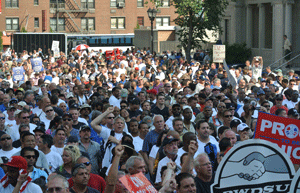Full-Time Work Shouldn’t Equal Poverty

July 23, 2012
By Marc Bussanich, LaborPress City Reporter
Tomorrow low-wage workers who work in different economic sectors in the city will be marching from Herald Square to Union Square. The rally and march is being coordinated by United NY—a union/community coalition. The organization just released a report, The Economic Low Road: Low Wage Workers and the One-Percenters, which shows that the city has both an unemployment and employment problem—many full-time workers do not make enough to support themselves and their families.
LP readers can read the United NY report via http://unitedny.org/files/2012/07/The-Economic-Low-Road-New-York-Low-Wage-Workers-and-the-One-Percenters.pdf
A snapshot of the report reveals that four in ten households in the city are forced to subsist on low wages. While the city has some of the highest paid workers in the world, it is the most unequal of the 25 largest cities in the U.S.
For example, John Lage, CEO of Lage Management Corporation, owns about 21 car washes, and homes in Queens and Westchester worth millions. Sonny Kim, owner of Golden Farm supermarket in Brooklyn, sold his home in Bergen County, NJ for $1.1 million, and Frank Argenbright of Air Serv is worth $300 million, while each of their workers are exposed to hazardous working conditions or receive pay as low as $4.86 per hour.
The Service Employees International Union 32BJ and the Retail, Wholesale, Department Store Union will be participating in tomorrow’s event. Rob Hill, a VP for 32BJ, said that his union is participating in the rally and march because there are tens of thousands of workers in the city working a little above or little below the minimum wage.
“There are all kinds of workers in different industries in the city working at or above the minimum wage, and we’re trying to bring attention to that fact,” said Hill.
The union is currently trying to organize as many as 15,000 workers (ramp workers, customer service, security personnel and wheelchair attendants) at the metropolitan area’s three major airports—Newark Liberty, JFK and LaGuardia. The union has been successful in organizing 11,000 security officers in the city, winning higher wages and health care coverage for about 75 percent of the organized.
“But there is thousands of security officers still not organized struggling to live on $8 or $9 per hour.”
Hill also noted the rally is intended to highlight which path the economy can take.
“If the federal minimum wage is raised in increments to at least $10 per hour, that extra $2 or $3 per hour could be going to workers who will spend it in their communities and would do more to reinvigorate our economy rather than the 1 percent pocketing more for themselves.”
Hill continued, “Nobody can live on only $8 per hour. Because airport workers aren’t earning enough, they have to rely on some form of public assistance to make ends meet, which costs everybody else in taxes. That’s not the way for a sustainable economy to work.”
As usual, whenever there’s talk or action to raise the minimum wage, the business community argues and fights back against it. Hill said, “The businesses with the immediate need for profit are creating a country where the middle class is shrinking, and as a result people have less purchasing power. So in the short-term, companies might save money, but as a whole the economy remains stagnant.”
Joining the retail, car wash and other low-wage workers will be members of Local 1-2, whose 8,500-strong union was locked out by Con Edison on July 1. In fact, 12 workers who used to work for Con Ed’s cleaning contractor, T&T Cleaning and Janitorial Services, recently filed suit against the contractor because they claim that the contractor violated the city’s Displaced Worker Protection Act when it fired them.
According to 32BJ, Con Ed has a history of hiring cleaning contractors that pay workers low wages. Before firing them, T&T decreased the workers’ wages from $9 per hour to $8.50.
Con Ed previously used A&A Maintenance, which recognized 32BJ as the union representing the 12 fired workers.
The union claims that the displaced worker act protects workers by requiring companies that change cleaning contractors to retain the predecessor’s employees for at least ninety days and to offer them continued employment after 90 days if their performance had been satisfactory.
The lawsuit, filed in State Supreme Court, seeks a court order directing T&T to offer them continued employment and to pay them lost wages for the time they have been out of work. marc@laborpress.org



